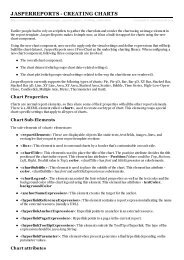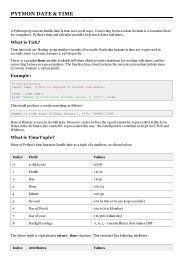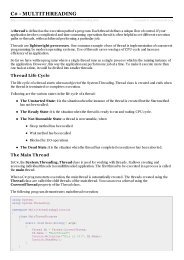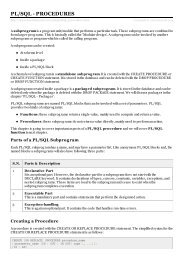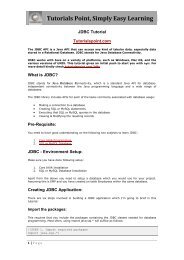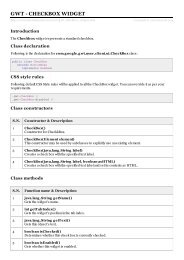download pascal tutorial (pdf - Tutorials Point
download pascal tutorial (pdf - Tutorials Point
download pascal tutorial (pdf - Tutorials Point
Create successful ePaper yourself
Turn your PDF publications into a flip-book with our unique Google optimized e-Paper software.
Initializing Arrays<br />
In Pascal, arrays are initialized through assignment, either by specifying a particular<br />
subscript or using a for-do loop.<br />
For example:<br />
type<br />
ch_array = array[char] of 1..26;<br />
var<br />
alphabet: ch_array;<br />
c: char;<br />
begin<br />
...<br />
for c:= 'A' to 'Z' do<br />
alphabet[c] := ord[m];<br />
(* the ord() function returns the ordinal values *)<br />
Accessing Array Elements<br />
An element is accessed by indexing the array name. This is done by placing the index of the<br />
element within square brackets after the name of the array. For example:<br />
a: integer;<br />
a: = alphabet['A'];<br />
The above statement will take the first element from the array named alphabet and assign the<br />
value to the variable a.<br />
Following is an example, which will use all the above-mentioned three concepts viz. declaration,<br />
assignment and accessing arrays:<br />
program exArrays;<br />
var<br />
n: array [1..10] of integer; (* n is an array of 10 integers *)<br />
i, j: integer;<br />
begin<br />
(* initialize elements of array n to 0 *)<br />
for i := 1 to 10 do<br />
n[ i ] := i + 100; (* set element at location i to i + 100 *)<br />
(* output each array element's value *)<br />
for j:= 1 to 10 do<br />
writeln('Element[', j, '] = ', n[j] );<br />
end.<br />
When the above code is compiled and executed, it produces the following result:<br />
TUTORIALS POINT<br />
Simply Easy Learning Page 83



